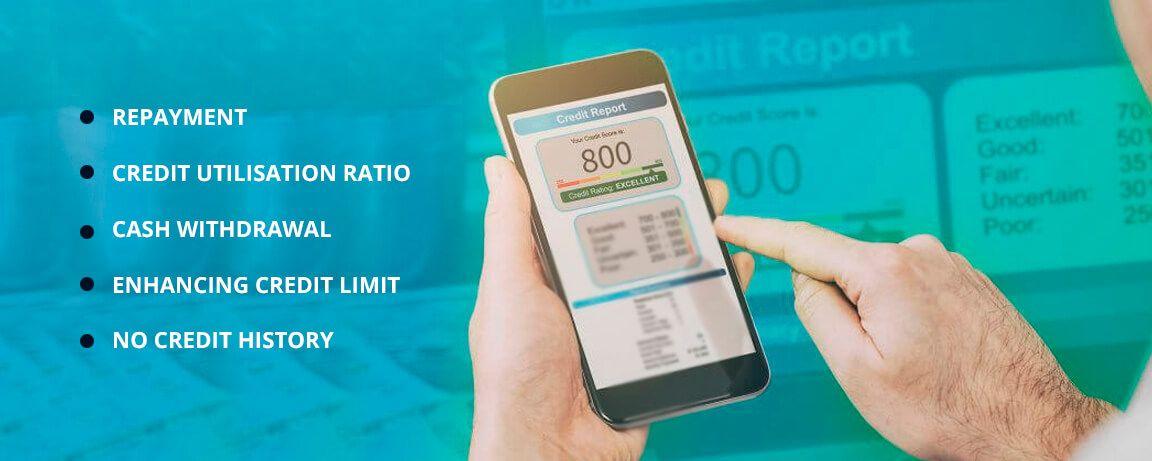7 Things That Can Have an Impact on Your Credit Score
In present times, transparency in operations has become the mantra for all financial institutions. This change has been mandated by recent news regarding NPAs (Non-Performing Assets), frauds, collusion,and corruption in the banking sector, which has shaken the public belief in the sector. In the wake of these developments, financial institutions have started following a stringent screening criterion while assessing the eligibility of applicants when they Apply for Credit Cards or any other form of loans.
Now financial institutions have established credit score as the single most important criterion to assess your eligibility for availing a credit facility. Every lender has a set threshold pertaining to the credit score which must be satisfied by you when you are applying for Credit Cards, Personal Loans, or any other financial products. Otherwise, your application won’t be processed further.
In order to offer ease of application to the customers for a financial product, most lenders have started providing online application facility. You can now log-on to the various online platforms and apply for Credit Cards or loans online along with multiple other financial products. You just need to provide some basic details while applying online and if your application is approved; the representatives from lender’s side will contact you for further processing.
What is a Credit Score?
A credit score is the numerical representation of your creditworthiness, calculated using specific algorithms based on a number of parameters. There are multiple credit bureaus in India, who calculate your credit score, which is used by various financial institutions while assessing your creditworthiness. Your credit score is calculated out of 900 and should ideally be over 750 to enhance your eligibility for loans and other credit facilities. One of the most used credit scores is from TransUnion CIBIL. Your credit score considers your past credit usage and repayment behaviour and is calculated as per weight assigned to each parameter.
Factors That Impact Your Credit Score
When it comes to the computation of your credit score, there is nothing much you can do. It is calculated by the credit bureaus based on the data supplied to them by the lenders. Therefore, your past credit behavior becomes a crucial factor that affects your current credit score. Here are seven critical factors that affect your credit score and must be taken care of from your side:
Repayment on the Due Date
It is important that you make the repayment for your Credit Card bills andEMIs (Equated Monthly Instalments) for other loans on or before the due date. If you fail to repay the amount on time, not only do you need to bear exorbitant penalties and fees, but your credit score also goes for a tumble. Missing even one payment can impact your credit score significantly,and if you make it a habit for 5-6 months, then it will take your credit score a significant time to improve.
Credit Utilisation Ratio
Before you apply for Credit Cards online, you must take care that the credit utilisation ratio should be below 40%. If it is more than 40%, it reflects your dependency on credit and impacts your credit score significantly. It is also a signal for the lenders that you have a highreliance on credit,and they might deter from advancing any other credit facility to you.
Cash Withdrawal on Credit Card
When you withdraw cash against your Credit Card on a frequent basis, the same is reported by the banker to the credit bureau,and it leads to a reduction in your credit score. On top of that, you must bear significant cash advancement charges for the transaction. It is best for you to avoid cash withdrawals against Credit Card and instead use them to make payments.
Enhancing Credit Limit Frequently
You might think that when your banker asks you to increase the limit on your Credit Card, it reflects greatly on your creditworthiness. In reality, when your credit limit is increased frequently, it indicates your dependency on credit,and it can impact your credit score if you do not maintain the optimal credit utilisation ratio of 40%.
Settled and Closed Loans
You must make sure that you never settle a loan and must close the loan properly. One-time or partial settlement offers from lenders might tempt you, as you are going to save some money on repayments, but it would in turn toast your credit score. So, always insist on closing the loan and taking the NOC (No Objection Certificate) from the lender regarding the same.
Errors in Your Credit Report
Though credit reports are system generated there can be some errors that might have crept in. This would impact your credit score negatively for no mistake of yours. So, you should check your credit report regularly and make sure that there are no errors in there. If you find any, report it to the credit bureau for rectification.
No Credit History
Your credit score is computed basedon loans and Credit Cards availed by you and your repayment history. If you have not taken any loan and did not have any credit history, it is impossible for the bureau to calculate your credit score and you might be stuck with no credit score at all.
Having a good credit score has become pre-requisite in present times if you want to avail a credit facility from any lender. You must pay close attention to the factors mentioned above and make sure that your credit score does not suffer from any such issues.
Also Read: 5 Best Lifetime Free Credit Cards in India 
